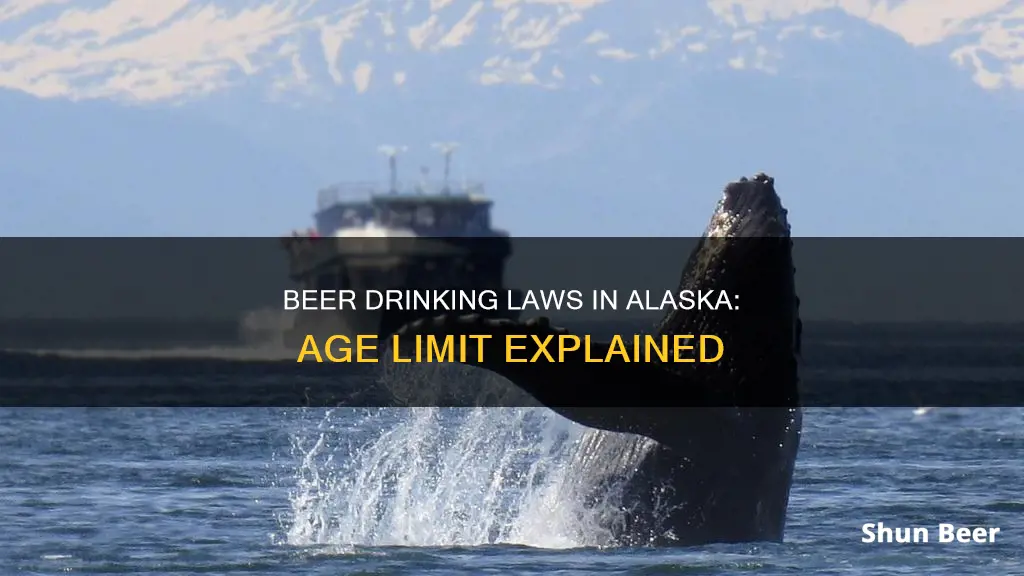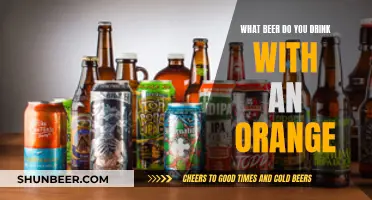
In Alaska, it is illegal for anyone under the age of 21 to buy, possess, or drink alcohol. However, there are some exceptions to this rule. For example, a parent, guardian, or spouse who is 21 or older may give alcohol to a minor in a private location, as long as it is not a licensed premises like a bar or restaurant. Additionally, licensed medical professionals may provide alcohol as part of a treatment. While the drinking age in Alaska is 21, the state has a history of volatile alcohol laws, with the minimum age varying over time and some “dry” and “moist” towns and villages implementing their own restrictions.
| Characteristics | Values |
|---|---|
| Minimum age to drink beer in Alaska | 21 |
| Minimum age to work in a bar in Alaska | 21 |
| Minimum age to work in a licensed eating place in Alaska | 18 |
| Minimum age to drink non-alcoholic beer in Alaska | No minimum age |
What You'll Learn
- In Alaska, it is illegal for anyone under 21 to buy, possess, or drink alcohol
- Those under 21 may drink alcohol in private locations if a parent, guardian, or spouse over 21 is present
- It is illegal for anyone under 21 to drive with any alcohol in their system
- Alaska has dozens of dry and moist towns and villages, which have various levels of prohibition
- Alaska alcohol laws allow licensed businesses to serve alcohol from 8 am until 5 am the following morning

In Alaska, it is illegal for anyone under 21 to buy, possess, or drink alcohol
There are serious and long-term consequences for drinking while underage or being caught with alcohol in your possession in Alaska. These can include fines, suspension of driving licenses, and even jail time. Alaska also has laws prohibiting boating while intoxicated (BWI) and driving under the influence (DUI), with mandatory penalties for convictions, including jail time, fines, and driving license revocation.
It is important to note that Alaska has dozens of "dry" and "moist" towns and villages, which have various levels of prohibition. These local ordinances may restrict sales hours and days, or they may choose to permit sales on election days. Licensed businesses in Alaska are allowed to serve alcohol from 8 am until 5 am the following morning every day, except for election days.
While the laws in Alaska prohibit minors from consuming alcoholic beverages, they do allow those under 21 to drink non-alcoholic beer or wine, which is legally no different from coffee, tea, or soft drinks. These beverages typically have less than 0.5% alcohol by volume (ABV) and are not considered "beer" under the federal definition. However, it is worth noting that some states, like Kansas, prohibit the consumption of any "cereal malt beverage," which includes most non-alcoholic beers.
In addition to the legal consequences, allowing minors to consume alcohol can have negative effects down the line. A study from Japan found a greater interest in consuming alcohol among adolescents who consumed non-alcoholic beverages that mimicked alcohol. Therefore, it is crucial for parents and guardians to research and consider the potential impact of allowing their children to drink non-alcoholic beer.
Understanding Beer Portion Sizes: Standard Drink Explained
You may want to see also

Those under 21 may drink alcohol in private locations if a parent, guardian, or spouse over 21 is present
In Alaska, the legal drinking age is 21. It is against the law for anyone under 21 to buy, possess, drink, or serve any alcoholic beverage. There are, however, a few exceptions to this rule.
One such exception is that those under 21 may drink alcohol in private locations if a parent, guardian, or spouse over 21 is present. This exception is in place to allow parents to teach their children about drinking in moderation, with the belief that it is better to learn about alcohol in a controlled environment at home than in a high-risk setting like a fraternity house. It is important to note that this exception only applies to private locations and does not extend to places with a liquor license, such as bars or restaurants.
Additionally, a licensed medical professional, such as a nurse or doctor, may furnish an alcoholic beverage as part of medical treatment, even to a minor.
While Alaska allows minors to drink under the supervision of a parent, guardian, or spouse, it is still illegal for them to possess or purchase alcohol. It is also illegal for them to have any alcohol in their system when driving, with a zero-tolerance policy for those under 21.
It is worth noting that Alaska has dozens of "dry" and "moist" towns and villages, which have various levels of prohibition. These local regulations may further restrict the sale and consumption of alcohol.
Beer After Running: Good Idea or Not?
You may want to see also

It is illegal for anyone under 21 to drive with any alcohol in their system
In Alaska, it is illegal for anyone under the age of 21 to buy, possess, drink, or serve any alcoholic beverage. This includes beer, which typically has an alcohol content ranging from 4-6% ABV (alcohol by volume). While non-alcoholic beer, defined as beer with less than 0.5% ABV, may be consumed by minors in some states, Alaska's laws do not permit this.
Alaska's laws regarding underage drinking are very clear and carry serious consequences. It is illegal for anyone under 21 to have any measurable alcohol in their system when driving, with a zero-tolerance policy. This means that even a trace amount of alcohol can result in legal repercussions. The state enforces strict penalties for drinking while underage, including license suspensions for drivers under 21 who are found to have any alcohol in their system. These suspensions increase in length for repeat offences, starting at 30 days for a first offence and reaching one year for a fourth or subsequent offence.
Additionally, it is important to note that Alaska has dozens of "dry" and "moist" towns and villages, which have various levels of prohibition. In these areas, the sale and consumption of alcohol may be restricted or prohibited altogether.
The legal drinking age of 21 is a federal guideline, but each state has the authority to set its own penalties for underage drinking and possession of alcohol. While Alaska allows those under 21 to drink non-alcoholic beverages, it maintains a strict stance on alcoholic beverages, with a clear definition of what constitutes an alcoholic drink.
It is worth noting that there are limited exceptions to the drinking age in Alaska. For instance, a parent, guardian, or spouse who is 21 or older may provide an alcoholic drink to a minor in a private setting, such as their home, but not in a licensed establishment like a bar or restaurant. Additionally, a licensed medical professional may furnish alcohol as part of medical treatment. However, these exceptions do not extend to driving; it is never legal for anyone under 21 to drive with any amount of alcohol in their system.
Beer and Tablets: Safe Mix or Health Risk?
You may want to see also

Alaska has dozens of dry and moist towns and villages, which have various levels of prohibition
In Alaska, it is illegal for anyone under the age of 21 to buy, possess, drink, or serve any alcoholic beverage. However, there is an exception where a parent, guardian, or spouse who is 21 or older may give alcohol to a minor in a private setting, such as their home. Additionally, a licensed medical professional may provide alcohol as part of medical treatment.
Alaska has a unique system of "dry" and "wet" towns and villages, which have varying levels of prohibition. A “dry village” bans both the sale and possession of alcohol, while a “wet village” permits both. There is also a third category, a "damp village", which permits the possession of alcohol but prohibits its sale. These different classifications lead to a wide range of restrictions on the possession and movement of alcohol. For example, in some "damp" villages, residents are allowed to order alcohol from outside the ban area and have it shipped in, while in other villages, the person owning the alcohol must personally bring it into the jurisdiction.
The ability for Alaskan communities to implement their own alcohol laws is a result of the state's legislation. Alaska specifically allows local jurisdictions to elect to go dry by public referendum. This means that individual towns and villages can decide to prohibit the sale and consumption of alcohol within their boundaries, creating a patchwork of dry and wet areas across the state.
The existence of dry and wet villages in Alaska has a significant impact on the availability and accessibility of alcohol for residents and visitors. It also affects the operations of businesses, such as bars and restaurants, that may need to adapt to the local regulations. While the specific reasons behind each community's decision to go dry or wet are not always clear, factors such as cultural norms, religious beliefs, and public health concerns likely play a role in shaping these unique alcohol landscapes.
The variety of prohibition levels in Alaska's towns and villages highlights the state's complex relationship with alcohol. While some communities choose to prohibit alcohol entirely, others permit it with certain restrictions, and still, others have no restrictions at all. This diversity in local alcohol policies showcases the importance Alaskans place on self-governance and local control, allowing each community to address the challenges and opportunities presented by alcohol in a way that aligns with their values and priorities.
Beer and Mounjaro: Safe Mix or Health Risk?
You may want to see also

Alaska alcohol laws allow licensed businesses to serve alcohol from 8 am until 5 am the following morning
In Alaska, it is illegal for anyone under the age of 21 to buy, possess, drink, or serve alcohol. There are some exceptions to this rule, such as when a parent, guardian, or spouse who is 21 or older provides alcohol to someone under 21, but only when the minor is not in a licensed establishment like a bar or restaurant. Additionally, a licensed nurse or doctor may provide alcohol as part of medical treatment. However, it is still illegal for a minor to give, serve, or sell alcohol to another person under 21.
Alaska's alcohol sales are regulated by the Alcoholic Beverage Control Board (ABC). The ABC sets the minimum standards for the sale and service of alcoholic beverages in various establishments, including restaurants and bars. These establishments must adhere to specific rules, such as having a valid ABC permit, ensuring all employees are 21 or older, storing alcohol in approved areas, and clearly marking beverages with their alcohol content.
One notable aspect of Alaska's alcohol laws is the extended hours during which licensed businesses are allowed to serve alcohol. Alcohol may be served or sold between 8:00 a.m. and 5:00 a.m. daily, providing a wider time frame for businesses to operate. This timeframe also includes certain areas with local option approval, where alcohol may be served until 6:00 a.m. on Sunday mornings.
To ensure responsible alcohol service, the ABC has implemented additional regulations. For instance, all servers and bartenders must be at least 21 years old and complete a Responsible Beverage Server Training course. Licensed retail establishments are required to hire only those employees who have undergone this training. The course covers vital topics such as recognizing intoxication, serving minors, and understanding the legal implications of serving alcohol to intoxicated individuals.
Furthermore, retailers must ensure that their employees comply with applicable state laws and regulations, including the post-service cleaning of all beverage containers. Alcohol must be sold or served in its original sealed containers, and retailers are prohibited from adding anything to these containers. These comprehensive measures aim to promote responsible alcohol consumption and prevent underage drinking.
Golfing and Beer: A Match Made in Heaven?
You may want to see also
Frequently asked questions
No, in Alaska, it is generally against the law for anyone under the age of 21 to buy, possess, drink, or serve any alcoholic beverage.
There are serious and long-term consequences for drinking while underage or being caught with alcohol in your possession.
Yes, those under 21 may drink non-alcoholic beer or wine with less than 0.5% ABV. Legally, these are no different from coffee, tea, or soft drinks.
No, only those aged 21 or older may work in these jobs. Adults aged 18-20 may work in a licensed eating place, but they may not sell or serve alcoholic beverages.
Yes, persons of any age under 21 may drink alcohol in private locations as long as a parent, guardian, or spouse over the age of 21 is present.







